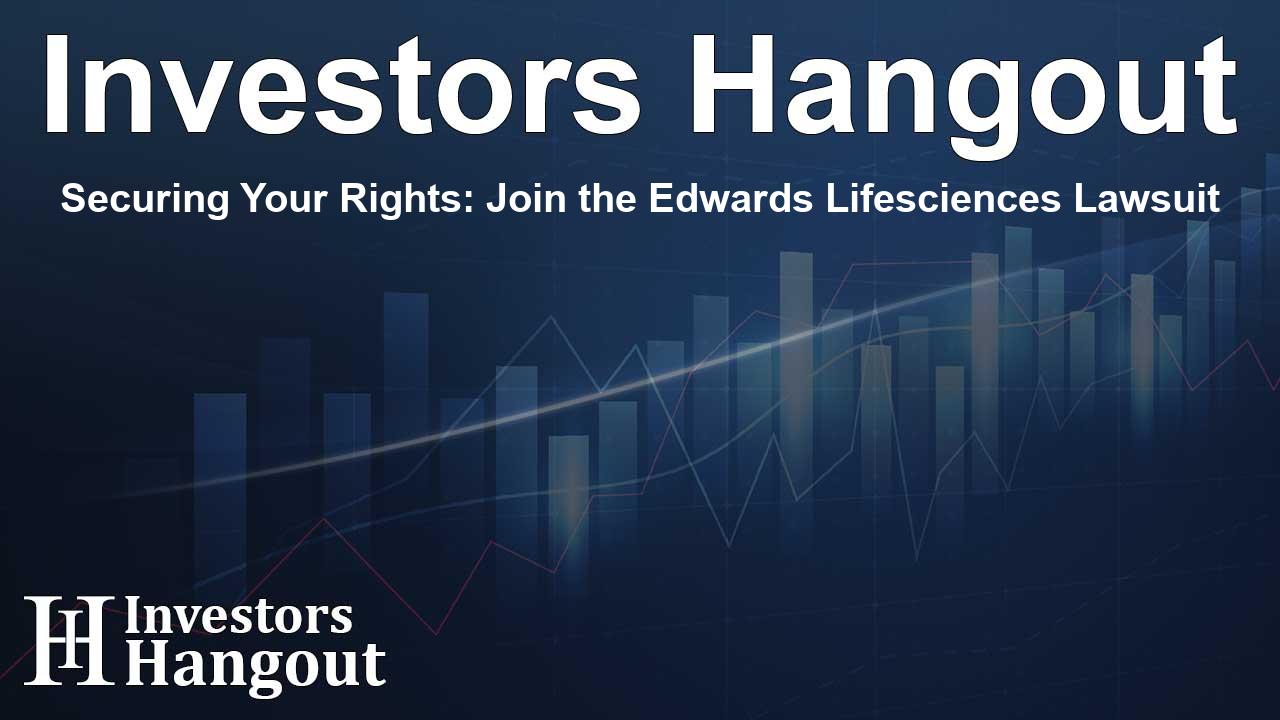Securing Your Rights: Join the Edwards Lifesciences Lawsuit

Understanding the Edwards Lifesciences Lawsuit
Kessler Topaz Meltzer & Check, LLP is rallying investors concerning a significant securities class action lawsuit against Edwards Lifesciences Corporation (NYSE: EW). The lawsuit addresses the claims made by investors who purchased Edwards securities during a specific timeframe. Investors are encouraged to be aware of their rights and the lead plaintiff deadline approaching. The final date to submit a lead plaintiff application is December 13, 2024, marking an essential timeline for concerned investors.
Who is Affected and What It Means
This lawsuit primarily involves those who acquired Edwards securities between February 6, 2024, and July 24, 2024. If you've been a part of this investment timeframe and feel you have incurred losses, your participation becomes essential. Engaging with legal firms like Kessler Topaz Meltzer & Check, LLP could provide the vital support and guidance needed during these proceedings.
Reasons for the Class Action
The allegations within the complaint indicate that throughout the class period, Edwards Lifesciences made positive statements about the performance of its key product, the Transcatheter Aortic Valve Replacement (TAVR). These statements purported to underscore the company’s growth prospects. However, the complaint suggests that these claims were misleading and failed to represent the actual state and viability of Edwards’ TAVR platform.
The Risks of Not Participating
Investors might find themselves at risk of missing out on potential recoveries from this lawsuit if they don’t actively engage in the process. Choosing to remain an absent class member could mean losing the opportunity to recover some of the losses incurred, while those who step forward may have the potential for collective recovery. It is crucial to act promptly and with the right guidance from seasoned attorneys.
Defendant's Apparent Misconduct
The lawsuit claims that Edwards Lifesciences provided an overly optimistic portrayal of the potential market for TAVR procedures. The company’s alleged over-estimation of interest from healthcare facilities in employing TAVR indicates a disconnect with the realities of evolving treatment options. This discrepancy highlights the importance of full transparency in corporate communications, especially regarding investor relations.
The Lead Plaintiff Process Explained
Investors participating in the lawsuit may seek to become lead plaintiffs, representing the larger group of affected investors. This involves demonstrating a significant financial stake in the situation and being willing to guide the legal process. If chosen, the lead plaintiff selects legal representation—often a law firm specializing in class actions like Kessler Topaz Meltzer & Check. The legal counsel will then work on behalf of the entire class, helping navigate the complexities of the case.
Contacting Kessler Topaz Meltzer & Check, LLP
If you've suffered losses linked to Edwards Lifesciences, reaching out to Kessler Topaz Meltzer & Check, LLP is a crucial step. These experienced attorneys can provide more detailed information about your situation and the possibility of joining the lawsuit. Options also include contacting Jonathan Naji, Esq., who is well-versed in securities litigation, for more personalized advice.
A Commitment to Investor Protection
Kessler Topaz Meltzer & Check, LLP holds a strong reputation in protecting investors' rights and representing those affected by corporate misconduct. Their diligence in class action suites has resulted in significant recoveries for clients affected by fraudulent practices. They remain dedicated to empowering investors, ensuring their concerns are addressed through robust legal frameworks and guidance.
Frequently Asked Questions
What is the deadline to become a lead plaintiff?
The deadline to apply to be a lead plaintiff in the Edwards Lifesciences lawsuit is December 13, 2024.
Who can join the lawsuit?
Any investors who purchased Edwards securities between February 6, 2024, and July 24, 2024, can join the lawsuit if they have sustained losses.
What does being a lead plaintiff entail?
A lead plaintiff acts on behalf of all class members, guiding the litigation process and selecting legal counsel to represent their interests.
Why is this lawsuit important?
This lawsuit seeks to address potential securities fraud and provide a path for investors to recover losses incurred due to misleading corporate statements.
How can I contact Kessler Topaz Meltzer & Check, LLP?
You can reach out to them directly by visiting their website or contacting Jonathan Naji, Esq., at their office for more information regarding your rights as an investor.
About The Author
Contact Evelyn Baker privately here. Or send an email with ATTN: Evelyn Baker as the subject to contact@investorshangout.com.
About Investors Hangout
Investors Hangout is a leading online stock forum for financial discussion and learning, offering a wide range of free tools and resources. It draws in traders of all levels, who exchange market knowledge, investigate trading tactics, and keep an eye on industry developments in real time. Featuring financial articles, stock message boards, quotes, charts, company profiles, and live news updates. Through cooperative learning and a wealth of informational resources, it helps users from novices creating their first portfolios to experts honing their techniques. Join Investors Hangout today: https://investorshangout.com/
The content of this article is based on factual, publicly available information and does not represent legal, financial, or investment advice. Investors Hangout does not offer financial advice, and the author is not a licensed financial advisor. Consult a qualified advisor before making any financial or investment decisions based on this article. This article should not be considered advice to purchase, sell, or hold any securities or other investments. If any of the material provided here is inaccurate, please contact us for corrections.
